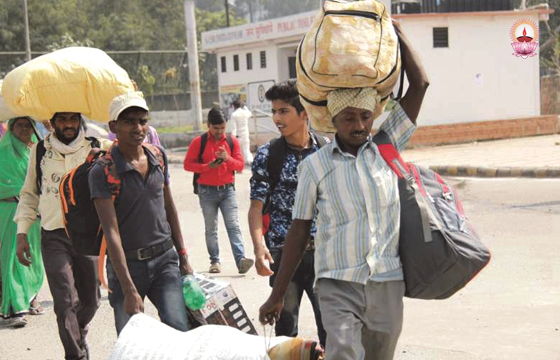Azadi ka Amrit Mahotsav Kolkata event honours four Clergymen
Pope Francis asks businesses to support working women: They’re ‘afraid to get pregnant’
Study: Christianity may lose majority, plurality status in U.S. by 2070
Indian politician declines Magsaysay Award under party pressure
Like John Paul II, Pope Francis heads to Kazakhstan during time of war

A new study sponsored by Catholic bishops in India has revealed the grim reality for most tribal migrant workers in the capital New Delhi where they suffer from endemic poverty and low wages amid an absence of workplace safety and socio-economic security.
The study, ‘Tribal Migrants in Delhi City: A Pre Covid and Post Covid Analysis,’ a joint venture by the Conference of Catholic Bishops’ of India (CCBI) Commission for Migrants and Workers India Federation, was released earlier this month.
Led by noted researcher Lata Jayaraj, the survey covers the migrants who belong to the tribal communities from neighboring states to Delhi. It analyzes the push and pull factors and the socio-economic compulsions of the migrants in pre-Covid and post-Covid situations.
“The study was an attempt to look into various factors behind migration, the various problems these tribal migrant workers face, and to analyze support system government agencies and NGOs have for them,” said Father Jaison Vadassery, secretary of the CCBI’s Commission for Migrants.
The priest noted that the study recommends a multi-pronged strategy from the government and non-government agencies to assist poor, vulnerable migrant workers effectively to overcome their miserable conditions.
The study used an in-depth analysis covering tribal migrant workers in the construction sector of Delhi. It reached out to 45 respondents, male and female, as samples who provided necessary information through case studies, focus group discussions and participant observations.
About 91% of tribal migrant workers in the construction sector are below 50 years, while only 8.8% are above 50. The sector is largely male-dominant, men accounting for 93.3%. The majority of them are Hindus.
Some 51% of workers migrated from Rajasthan, 16% from West Bengal, and 9% each from Assam, Jharkhand and Madhya Pradesh.
The study found a direct link between their low level of education, poverty, migration and low-paid employment.
Leave a Comment